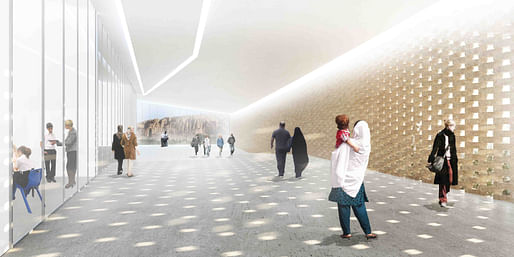

The Bamiyan Culture Centre is space in which to reclaim, reflect upon, strengthen, and celebrate the culture of Afghanistan. Located in the remarkable valley of Bamiyan, this new destination serves the monumental purpose of nurturing connections and forging ties between both the Afghan people and visitors with the nation’s complex heritage, its thriving customs, its legacy of artistic and cultural production, and the vitality of its resilient spirit.
The Center will enable UNESCO’s mandate for nation-stabilization and rehabilitation by providing a space that will guard Afghanistan’s heritage and foster healthy, positive cultural growth. The design is an insertion into the physical landscape that embodies and supports these ambitions for reflective appreciation and active culture-making. Engaging and gesturing toward the past, the space communicates optimism in the meaningful role that history plays in the nation’s progression toward the future.
The site’s plan derives from the patchwork composition of the region’s crops. Way-finding paths are placed among programmable cells that offer areas for the planting of apples, potatoes, apricots, and collection of water and solar energy. Harvested crops stimulate the regional agricultural economy while providing nourishment for the Bamiyan community and visiting tourists.
Across the grounds, canopies shade educational nodes where visitors may educate themselves in outdoor exhibits. Fitted for energy-collection, these learning pavilions also provide energy outlets where the public may charge their electric devices.
As one approaches the Cultural Centre by way of the main arterial path, views are curated to enhance their experience of the Buddha Cliffs in the distance.
The building is embedded into the earth, creating a subtle transition from exterior to interior that follows along a north wall comprising gradient-rotating mud bricks. This wall filters light into the museum, creating diffused and nuanced effects within exhibition, classroom, and workshop spaces.
The Cultural Centre’s mud brick construction captures a desire to reframe a stigmatized and sensitive practice through beauty and optimism. The use of this material will create local job opportunities; this building presents great potential in stimulating the region’s economy.
The Bamiyan Valley serves as the main backdrop to art-viewing, dining, tea-drinking, and other activities hosted within the Cultural Centre, amphitheatre, and teahouse situated on the site. The façade of the exhibition space creates deliberate views toward the niches left by the two Buddha’s in 2001. The axis from the Cultural Centre site to the Buddha Cliffs serves as a primary driver of organization, a homage to the region’s past as an anchor for its future.
The Bamiyan Cultural Centre will make a significant contribution to Afghanistan’s growth and promotion of its identity as a nucleus for cultural understanding and community cultivation.